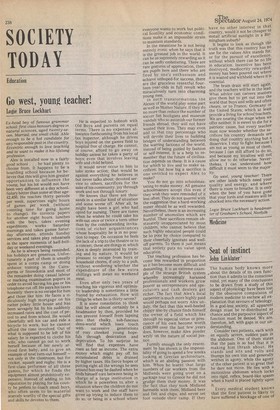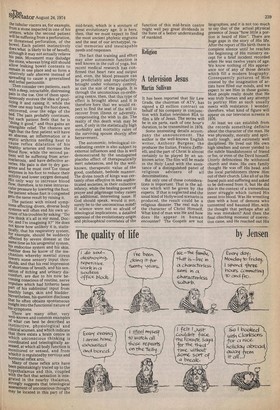Medicine
Seat of instinct
John Linklater '
The human body knows more about the details of its own function than it admits to the conscious mind, yet many of the conclusions to be drawn from a study of this aspect of physiology have been lost by the obsessive compulsion of modern medicine to eschew all explanation that savours of teleology. In a god-less society, all apparent design must be re-distributed as chance and the purposive aspect of function must be denied. We are, therefore, left with gaps in our understanding. Consider two patients, each with an equally severe, sudden pain in the abdomen. One of them states that the pain is so bad that it is making him thrash about. He stands and sits and rolls and thumps his own loin and generally writhes in agony, while the agony of the other patient is so great that he dare not move. He lies with a motionless abdomen which locks into rigid, reflex, board-like spasm when a hand is placed lightly upon it.
Every medical student knows that the first patient is likely to have suffered a blockage of one of the tubular viscera as, for example, from a stone impacted in one of his ureters, while the second patient will be suffering from a perforation, or threatened perforation, of the bowel. Each patient instinctively does what is likely to be of benefit, although it may not actually relieve his pain. Movement may dislodge the stone, whereas lying still should allow leaking bowel contents to remain in one place and so form a relatively safe abscess instead of spreading to cause a generalised and lethal peritonitis. Then consider two patients, each With a deep, intractable, distressing Pain in the toe. One of them spontaneously evolves the idea of poulticing it and raising it, while the Other one may hang the foot down, uncovered, over the edge of the bed. The pain probably continues, but each patient feels that he is "doing it good," and thus gains an intangible relief. The chances are high that the first patient will have an abscess, an inflammation or a septic arthritis needing heat to cause reflex dilatation of his healthy arteries and increase the blood flow, while the second patient will be suffering from arteriosclerosis, and have defective arteries. His pain is due to dry gangrene and he must cool tie tissue enzymes in his foot to reduce their activity and lower oxygen demand. His only way to increase blood flow, therefore, is to raise intravascular pressure by lowering the foot: the patient whose foot is congested gets the same result by raising it. The patient with mixed symptoms affecting divers, diverse body systems will often end his own account of his troubles by asking: "Do You think it's.all in my mind, Doctor, and I'm imagining it?" He does Rot know how unlikely it is, statistically, that his respiratory system, for example, should be suddenly affected by severe disease at the same time as his urogenital system, his endocrine system and his skin. Neither does he know of the mechanism whereby mental stress lowers some sensory input thresholds, and that his real impression Of shortness of breath, and his sensation of itching and urinary discomfort, are due to his now beCoining conscious of routine, nerve impulses which had hitherto been Part of his subliminal input from heathly lungs, skin and bladder. Nevertheless, his question discloses that he often obtains spontaneous insight into the functional nature of his symptoms.
There are many other, very well-known and common examples of what can best be described as instinctive, physiological and clinical acumen, and which indicate that there exists a• brain centre in Which unconscious thinking is coordinated and teleologically assessed, at which all body function is monitored or sensed, and from Which it is regulated by nervous and hormonal reflex arcs.
Many of these reflex arcs have been painstakingly traced up to the hypothalamus and this, coupled With the fact that sensation is integrated in the nearby thalamus, strongly suggests that teleological assessment of unconscious thought may be located in this part of the mid-brain, which is a strcture of great evolutionary age. It is here, then, that we must expect to find the most ancient phyletic engrams and the seat of our archetypal, racial memories and inescapable needs and responses.
The fact that training and effort may alter autonomic function is well known in the cult of yoga, but recent medical research has confirmed that heart rate and output and, even, the blood pressure can be predictably and reproducibly brought .under voluntary control, as can the size of the pupils. It is through the unconscious co-ordin ating centre, then, that this type of effect is brought about and it is therefore here that we would expect to find the seat of the will to recover from illness or adversity, compensating the wish to die. The reality of this death wish may be seen, if only in the statistically high morbidity and mortality rates of the surviving spouse shortly after bereavement.
The autonomic, teleological coordinating centre is also subject to external influences and this is well demonstrated by the undisputed placebo effect of therapeutically inert substances, and by the wellknown, therapeutic value of the good, confidant, bedside manner. The divine touch of kings was certainly often effective in less sophisticated societies, in their collective infancy, while the healing power of prayer and pilgrimage today raises an additional, interesting issue. If God should speak, would it not, surely be to the unconscious mind? If science were not so afraid of teleological implications, a detailed appraisal of the evolutionary origin and philosophical correlates of the
function of this mid-brain centre might well pay great dividends in the form of a better understanding of mankind.



































 Previous page
Previous page